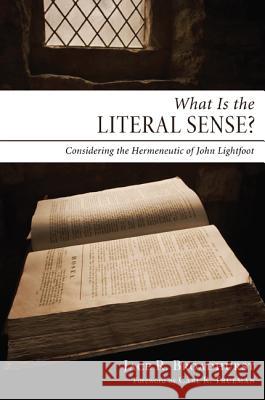What Is the Literal Sense?: Considering the Hermeneutic of John Lightfoot » książka
What Is the Literal Sense?: Considering the Hermeneutic of John Lightfoot
ISBN-13: 9781610974066 / Angielski / Miękka / 2012 / 240 str.
What Is the Literal Sense?: Considering the Hermeneutic of John Lightfoot
ISBN-13: 9781610974066 / Angielski / Miękka / 2012 / 240 str.
(netto: 131,53 VAT: 5%)
Najniższa cena z 30 dni: 136,23
ok. 16-18 dni roboczych.
Darmowa dostawa!
Invariably, people who read Scripture are forced to answer the question, "What is the 'literal sense'?" This question is not new. In the seventeenth century, John Lightfoot--signer of the Westminster Confession of Faith and a master of Hebrew and of rabbinic writings--wrestled with the same question, and his conclusions had a profound impact in the world of hermeneutics. In an age of much animosity towards the Jews, Lightfoot embraced the insights found in the Jewish writings while staying grounded in his reformational dogmatic theology. In so doing, his exegesis could properly be considered a via media between Reformed Scholasticism and Judaism. Lightfoot's hermeneutical principles and presuppositions outlined in this book not only provide valuable insight into his thinking but also reject the previously normative notion that Reformed Scholasticism has little to offer dogmatically or exegetically. The current tensions between systematic and biblical theology, the rise of interest in Second Temple and medieval Judaica, and the never-ending question of biblical authority make What Is the Literal Sense? an important read. "Jace Broadhurst's study of the Puritan John Lightfoot provides a stimulating example of a seventeenth-century divine wrestling through the Reformation principle of sensus literalis amid a growing knowledge of non-biblical resources. Lightfoot became an expert in Judaica, arguing . . . that classic Jewish commentaries can situate the reader to gain more accurate exegetical insight. . . . Lightfoot put forward guidelines in his particular view of sensus literalis, and in this way he serves as a bridge between precritical and critical biblical scholarship." --Kelly M. Kapic Professor of Theological Studies, Covenant College Author of Communion with God: The Divine and Human in the Theology of John Owen (2007) "Jace Broadhurst has offered us the most significant study to date of an early modern giant in the field of biblical studies. This compact volume helpfully illumines John Lightfoot's best insights on the plain sense of Scripture while graciously exposing a great man's inconsistencies. Unusually, Dr. Broadhurst's instincts as a historian are matched by his abilities as an exegete. . . . T]his exploration of Lightfoot's hermeneutics is greatly enriched by the fact that our author intimately understands his subject's subject." --Rev. Chad Van Dixhoorn Associate Pastor, Grace Presbyterian Church, Vienna, Virginia Senior Research Fellow, Wolfson College, University of Cambridge Editor of Minutes and Papers of the Westminster Assembly, 1643-1652 (2011) Jace R. Broadhurst (Ph.D. Westminster Theological Seminary) is Senior Pastor of Poolesville Baptist Church and Professor at Columbia Evangelical Seminary. He is the author of numerous articles on hermeneutics and homiletics.
Invariably, people who read Scripture are forced to answer the question, "What is the literal sense?" This question is not new. In the seventeenth century, John Lightfoot--signer of the Westminster Confession of Faith and a master of Hebrew and of rabbinic writings--wrestled with the same question, and his conclusions had a profound impact in the world of hermeneutics. In an age of much animosity towards the Jews, Lightfoot embraced the insights found in the Jewish writings while staying grounded in his reformational dogmatic theology. In so doing, his exegesis could properly be considered a via media between Reformed Scholasticism and Judaism. Lightfoots hermeneutical principles and presuppositions outlined in this book not only provide valuable insight into his thinking but also reject the previously normative notion that Reformed Scholasticism has little to offer dogmatically or exegetically. The current tensions between systematic and biblical theology, the rise of interest in Second Temple and medieval Judaica, and the never-ending question of biblical authority make What Is the Literal Sense? an important read. "Jace Broadhursts study of the Puritan John Lightfoot provides a stimulating example of a seventeenth-century divine wrestling through the Reformation principle of sensus literalis amid a growing knowledge of non-biblical resources. Lightfoot became an expert in Judaica, arguing . . . that classic Jewish commentaries can situate the reader to gain more accurate exegetical insight. . . . Lightfoot put forward guidelines in his particular view of sensus literalis, and in this way he serves as a bridge between precritical and critical biblical scholarship."--Kelly M. KapicProfessor of Theological Studies, Covenant CollegeAuthor of Communion with God: The Divine and Human in the Theology of John Owen (2007)"Jace Broadhurst has offered us the most significant study to date of an early modern giant in the field of biblical studies. This compact volume helpfully illumines John Lightfoots best insights on the plain sense of Scripture while graciously exposing a great mans inconsistencies. Unusually, Dr. Broadhursts instincts as a historian are matched by his abilities as an exegete. . . . [T]his exploration of Lightfoots hermeneutics is greatly enriched by the fact that our author intimately understands his subjects subject."--Rev. Chad Van DixhoornAssociate Pastor, Grace Presbyterian Church, Vienna, VirginiaSenior Research Fellow, Wolfson College, University of CambridgeEditor of Minutes and Papers of the Westminster Assembly, 1643-1652 (2011)Jace R. Broadhurst (Ph.D. Westminster Theological Seminary) is Senior Pastor of Poolesville Baptist Church and Professor at Columbia Evangelical Seminary. He is the author of numerous articles on hermeneutics and homiletics.











